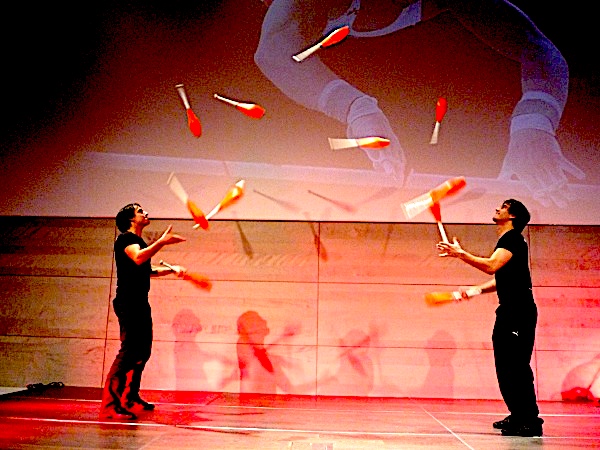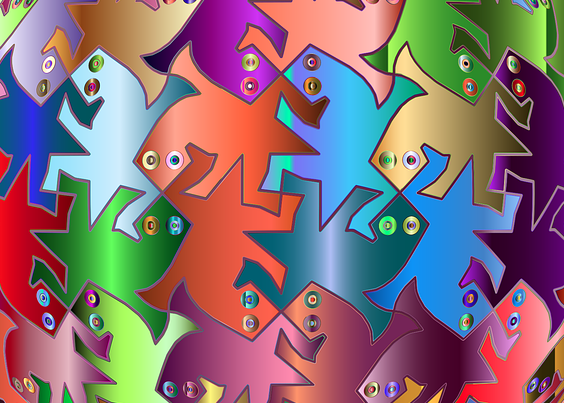Truly liberating oneself from propaganda and transcending the identities that have been largely manufactured is the riskiest of ventures, writes Jonathan Cook.

Jugglers Christoph and Manuel Mitasch passing clubs in Linz, Austria, 2010. (Cmitasch, CC BY-SA 3.0, Wikimedia Commons)
By Jonathan Cook
Jonathan-Cook.net
 Of course, I expect a backlash every time I write. It comes with the territory. There is no point being a Bari Weiss or a David Frum and crying out against “cancel culture.” Dissension is part of the rough and tumble of a modern world in which everyone — at least, for a little longer — gets their 15 minutes of sounding off, however ignorant their opinions. There are millions of people out there on social media, and some of them seem to have pretty disturbing views.
Of course, I expect a backlash every time I write. It comes with the territory. There is no point being a Bari Weiss or a David Frum and crying out against “cancel culture.” Dissension is part of the rough and tumble of a modern world in which everyone — at least, for a little longer — gets their 15 minutes of sounding off, however ignorant their opinions. There are millions of people out there on social media, and some of them seem to have pretty disturbing views.
But I don’t write just to be provocative, as some readers appear to imagine. I write to influence. Not so much what we think — though that’s a nice bonus —but how we go about the task of thinking.
In societies bombarded with propaganda — propaganda that gets ever more sophisticated as software and algorithms learn through billions of tiny mind experiments how to trigger us, arouse us, incentivize us — it is extraordinarily hard to think clearly. It requires a huge amount of mental and spiritual energy to gain distance. That’s very difficult to do if we spend all day working, or we are exposed all day to the news cycle. The biggest problem is not just that our thoughts are likely to be someone else’s (often Rupert Murdoch’s), it is that we don’t even know that they belong to somebody else. That is how propaganda works.
This difficulty means I spend a lot of time thinking about which topics to write about. I need to select issues prominent enough in the news that people will wish to invest a little more time to read my contribution. But at the same time the topic I choose needs to illustrate my chief concerns — that we are being propagandized into ever more polarized, antagonized tribal identities — starkly enough that readers will be prepared to reconsider the strong views they already hold on the matter at hand.
Challenging ever-more polarized and deeply entrenched tribal identities often feels like a high-wire act in which the only way to have an impact is to keep raising the wire a little higher. The more an audience loses critical distance on an issue — the more tribal it becomes — the more it has to be jolted out of its complacency, out of its sense of what constitutes normality or sanity. But the jolt itself can prove counter-productive, simply reinforcing the tribe’s certainty that anyone who disagrees must belong to the other tribe, the enemy, and can therefore be safely ignored.
How We Think

Stream of consciousness. (Tim Caztez, Flickr)
I have been researching and writing daily on foreign affairs, mostly related to the Middle East, for 20 years. That’s a long time, and inevitably over that period I have grown more confident in my worldview and I have wanted to deepen and broaden my perspective.
Certainly, there are lessons I have learnt from two decades of reporting on, and analyzing, Israel and Palestine that I think are of wider import. It is a region whose features I have been able to study with a degree of dispassion — because the “conflict” isn’t exactly mine — but also with a great deal of intimacy — because I ended up marrying into that conflict. I understand very well how a modern settler colonial state works and how a strong tribal identity is key to its success. I understand too well the way it inevitably spawns the infrastructure of a militarized, hi-tech, surveillance state, and how an elite needs to constantly manipulate the public into a sense of existential crisis to keep itself enriched and powerful.
Any of that sound familiar outside Israel-Palestine?
The problem is that it is much easier to see how Israeli Jews are propagandized, how they are invested in an entirely manufactured tribal identity that keeps them oppressing Palestinians, than it is to see how we ourselves are propagandized, or how our own manufactured tribal identities work in much the same way.
Support CN’s Winter Fund Drive!
Which is why every time I write about the United States, where the most propagandized population on the planet lives, I receive the biggest backlash from readers:
“Stick to writing about Palestine,” “You don’t know enough about the US to have a view,” “What happened to you – you were great when you just wrote about Israel-Palestine.” And those are the polite responses.
What appears to be upsetting some readers isn’t so much the facts I am writing about. After all, in this intensely globalized world, where we can all read the same newspapers online and we can all watch YouTube videos of the actual events themselves, I know as much as you most likely do about what happened — whether it’s in Nablus, Bristol or Kenosha. Unless you were there, and got an angle on events denied the rest of us, we are debating the same set of real-world events or the same set of corporate media depictions of those events.
The issue often isn’t what we know (though increasingly we choose to close our ears to information that does not confirm our prejudices), it’s how we analyze what we know.
Emotional Investment

International demonstration in solidarity with Palestine, Berlin, 2017. (Flickr Montecruz Foto)
People who began following me because of my writings on Israel-Palestine, or the acres of related stuff I wrote countering the Zionist misinformation campaigns in the U.K. intended to vilify Jeremy Corbyn, are already a fairly select group of people who trust my analytical skills when it comes to an issue on which they have managed to see past the propaganda most others are still in thrall to.
What I know through meeting a small proportion of those readers is that their ability to break out of the mainstream mindset was typically based on an unusual or intensely personal experience they had. Maybe they visited Israel and Palestine and were shocked by the yawning gulf between what they had read in the corporate media and what they saw on the ground. Or maybe they knew Corbyn to be an authentic politician and a committed anti-racist and could not believe how he was depicted in every single corporate news outlet in the U.K.
Direct experience of the way the news is skewed set them on a path towards questioning the propaganda they had been subjected to over a lifetime.
But just because we manage to break out of the propaganda construct on one issue does not mean we succeed on every issue. Things that feel intensely personal to us, in which we are emotionally or materially invested, are always going to be the hardest to view from a distance. And for obvious reasons, nothing is so personal, so deeply invested in, as our social and political identities. To question our identity is both to loosen ourselves from the rock that anchors us to the ground we know best and to risk alienating the social networks we depend on. Truly liberating oneself from propaganda — transcending the identities that have been largely manufactured for us – is the riskiest of ventures, which is why so few are willing to do it.
I witnessed that especially keenly in Israel-Palestine, where Jews who cast aside the tribal comfort blanket of Zionism were themselves cast out by their own societies. When we criticize Israeli Jews for failing to stand in solidarity with Palestinians, we should also remember how hard it is intellectually and emotionally to go against the grain of your society. It takes significant courage.
I have seen it too in the way anti-Zionist Jews in the Labour Party have been hounded out because they refuse to be used by the parliamentary party’s dominant Blairite wing to settle political scores with the more socialist membership. When these anti-Zionist Jews refuse to abandon their anti-racist principles and become tribal Zionists — Zionists who demand special diplomatic treatment for a self-declared ethnic state that, in turn, demands special privileges for Jews over Palestinians — they are demeaned as self-hating or the “wrong kind of Jews.” Seeing their treatment, one can understand why so many British Jews might never think to question what they have been told — or might prefer to keep their heads down.
And that is the point. It is not that we make a choice to stay propagandized. It doesn’t require any effort from us at all. All we need do is not make a choice. Our socially constructed tribal identities are the default. All we need to do is go about our daily lives as normal.
Propagandized Populations

(_mixer_, Flickr, CC BY-SA 2.0)
For many of us, who lack a strongly Zionist tribal identity (though of course in the West we have been raised with a more general, colonial Zionist identity since at least the 1917 Balfour Declaration) it is fairly easy to understand how Zionist Jews have been propagandized and how far their thinking can stray from reality. In early 2015 –— months after Israel’s horrifying attack on Gaza that killed hundreds of Palestinian children and led to an outpouring of criticism of Israel in the U.K. and elsewhere — a survey found that 56 percent of British Jews believed “anti-Semitism in Britain has some echoes of the 1930s.”
Remember this survey was before Corbyn had been elected Labour leader and before the furor about a supposed anti-Semitism crisis in the party had moved into full gear. God knows, what a similar survey of British Jews would find today.
At that stage, even a prominent liberal commentator for the Israeli Haaretz newspaper found the views of most fellow Jews in the U.K. preposterous:
“If the majority of British Jews and the authors of the CAA [Campaign Against Antisemitism] report actually believe that, then it’s hard to take anything they say about contemporary anti-Semitism in their home country seriously. If they honestly think that the situation in Britain today echoes the 1930s when Jews were still banned from a wide variety of clubs and associations, when a popular fascist party, supported by members of the nobility and popular newspapers, were marching in support of Hitler, when large parts of the British establishment were appeasing Nazi Germany and the government was resolutely opposed to allowing Jewish refugees of Nazism in to Britain, finally relenting in 1938 to allow 10,000 children to arrive — but not their parents who were to die in the Holocaust (that shameful aspect of the Kindertransport that is seldom mentioned) — and when the situation of Jews in other European countries at the time was so much worse, then not only are they woefully ignorant of recent Jewish history but have little concept of what real anti-Semitism is beyond the type they see online.”
Paradoxically, Haaretz columnist Anshel Pfeffer would soon subscribe himself to much of the nonsense he excoriates here — as soon, in fact, as Corbyn was elected to head the Labour party.
Which is a reminder of how quickly we can adapt our understanding of what we think of as real, objective facts, or falsehoods, when it helps to protect our tribal identities. We see what we want to see.
Pfeffer, a liberal Zionist, thought the paranoia of conservative Zionist Jews was ridiculous when Ed Miliband, a liberal Zionist like Pfeffer and a gentle critic of Israel, led the Labour Party. But once Corbyn took over, a genuine anti-racist who opposed the “liberal” racism inherent in a self-declared Jewish state, Pfeffer started to feel much more ideologically aligned with conservative British Jews. Indeed, he soon shared most of their assumptions about a supposed rise in “leftwing anti-Semitism” he had derided more generally months previously.
In short, the survey did not tell us much useful about the state of anti-Semitism in Britain in 2015. But it did tell us an awful lot about how propagandized many British Jews already were about anti-Semitism in 2015. It was a signpost, a clue as to where things were about to head.
Losing the Plot

M.C. Escher sphere orb, detail. (Pixabay)
Jews, it should go without saying, are not uniquely susceptible to propaganda or uniquely invested in a tribal identity. We all are.
It is easy to point the finger at Zionist Jews for some of their outrageous, self-serving, supremacist views. Much harder to spot those same tendencies in ourselves.
Which is why not only complete strangers harangue me on social media when I turn the spotlight on leftwing tribalism — I expect that — but long-standing followers do too.
If you love my Israel-Palestine stuff, or my Labour Party criticisms, but think I’ve lost the plot on the other stuff, please believe me when I say my criticisms of Western tribalism spring from exactly the same set of analytical skills I bring to bear on Israel-Palestine. I am not suddenly or arbitrarily applying a whole set of other analytical criteria to the issues you care most passionately about simply out of a perverse desire to provoke you.
It may be, just possibly, that you are provoked because the conclusions I arrive at on issues close to your heart challenge your own tribal identity — what you perceive to be the left, or to be progressive discourse, or to be anti-racism. Accepting my arguments might require you to become more flexible or curious than you want to be, or it might force you to consider that some of your views stand in stark contradiction to other values you profess to believe in. That inconsistency intrigues me enough to write about it, but it may well infuriate you.
Which may explain the strange, angry responses from some followers to the soundbites from my lengthy articles — the snippets — I must necessarily post on social media. Rather than being provoked into reading the article, where they would need to grapple with a complex argument, some followers prefer to comment on the soundbite. But if you are among those who say you are fed up with our modern, dumbed-down, soundbite culture — those, for example, who supported Corbyn because he wasn’t a focus-group politician — you should not really be fetishizing that soundbite culture yourself. Well, not if you want to avoid the accusation of hypocrisy.
Carlson Clones

Tucker Carlson in 2020. (Gage Skidmore, CC BY-SA 2.0, Wikimedia Commons)
If you’re also wondering why all the writers you once loved so much have suddenly become raving Tucker Carlson clones, it might — just might — be because you changed rather than they did. Like Anshel Pfeffer, maybe you arrived at your Corbyn crisis moment. Let me take a punt and suggest that Donald Trump and the rise of the white right may have made your tribal identity seem much more precious to you.
That won’t have made you a clearer thinker. It will have simply made you an angrier, less compromising, less compassionate thinker. It will have encouraged you to think in zero-sum terms. It will have pushed you away from anyone who does not espouse exactly your pieties. It will have made you less willing to consider the arguments of anyone who no longer echoes your binary view of the world. It will have made you a liberal-left version George W Bush, with his warning: “Either you are with us, or you are with the terrorists.”
That should not surprise us. A tribal left is bound to be the mirror image of a tribal right. They have different pieties, different slogans, but the same intolerance, the same self-righteousness, the same anger.
In tribal times like these, those who see the dangers of tribalism — that it is a tool for dividing us, for weakening us against the power-elites and a billionaire-owned media that relishes and stokes our tribalism — will struggle to be heard. Anything they say that isn’t for the tribe is assumed to be for the enemy. They have moved to the dark side.
In a time of tribalism, the left’s duty is to speak out loudly for solidarity. We need to remember that we are no less exposed to propaganda than the other tribe. That doesn’t mean we have to abandon our principles. But it does mean we have to remember they are as human as we are, that they have the same rights as us, that it is crucially important that we are fair and consistent, that our blind spots can be as big as theirs. Because otherwise we not only entrench our own tribalism, we entrench theirs too.
Jonathan Cook is a former Guardian journalist (1994-2001) and winner of the Martha Gellhorn Special Prize for Journalism. He is a freelance journalist based in Nazareth. If you appreciate his articles, please consider offering your financial support.
This article is from his blog Jonathan Cook.net.
The views expressed are solely those of the author and may or may not reflect those of Consortium News.
Support CN’s
Winter Fund Drive!
Donate securely with PayPal
Or securely by credit card or check by clicking the red button:


Its really blind to believe tribalism is only propagandized as this important article but too superficial and narrow-minded falters at.
To believe only the elites are at fault for society`s transgressions is irrational, convenient, misleading, and sub-consciously patronizing: its a view that implies that people simply dont have a mind of their own, or that they are too stupid or gullible; It ignores the fact that most have a sound, deeply seated and unshakable system of beliefs – and/or tribal identities- of their own. propagandists will enflame, trigger or use these set cognitions -and might at times contribute to their creation or evolution- but these identities dont need them on principle to exist.
It is a much more nuanced and complex interplay between multitudes and powerful minorities than this writer and many like him describe.
his attitude is as black-and-white as the readers he`s depicts here and whom he`s trying to educate how to think .
Great!
René Girard’s “undifferentiation” exactly.
So, thank you Jonathan and CN. Yep Jonathan, it seems like your
understanding of the Mideast did get you ready for this branch
over to “anthropological.”
One thing I surmise is that there’s a percentage of people who
actually have to deal with the pandemic [up close, personal, and in
serious quarantine] who see science differently. You might try to
claim they’re their own tribe; in a way yes, but in another sense
they’re kind of an offshoot. The big tribes are to the right of’em and to the “left” of’em and not in their field…the rightish one get’n bigger all the time. Things shook out strangely around
“science.” The left tribe understood the dangers of carbon dioxide, depleted Ur, and
oil spills, but kept believing in robotized everything till late in
the game. Which could lead into what might seem a big digression. At
the “top” of the “left”/blue tribe, in terms of say Hindu philosophy, you had/have
a well published group [often robot & AI fans BTW] who believe souls aren’t
real. Which I believe goes along with some Advaitin takes [I’m trying to put
the differing metaphysical outlooks/schools in a context of many
centuries]. I won’t try to go into this from an involved
scientific standpoint. See Rupert Sheldrake.
But, indeed, there’s almost no end to where that kind of digression
could go. I could write about another subject germane to science and the tribes, but I’ll
focus briefly on this souls matter [which touches on things like NDEs eg], cause it won’t get anyone in trouble. In a way with this 200 yr onslaught of neoliberalism [yeah it was then too] and war and
determinism and industrial consumerism…you’d think it might be
natural for some different phase to arrive. An interlude of quasi
pluralism. Maybe it’ll come. Maybe it’ll have to wait till the real
climate problems settle in, like Alfred W. McCoy seems to be saying
may be the case. Many have become tolerant of Islam; so perhaps that
age to come will be tolerant of a real hybridized slice of
folks who already think quantum indeterminacy has some bearing on somethin (I’m in such a slice I guess). I think consciousness synchs in with potentialities. But I don’t think
the potentialities are as discrete as some “seem” to think (do they?).
I believe in more freedom/leeway. It can be put in simple words, not requiring some
journal readership familiar with exotic terms to be grasped.
Consciousness is not only the perception of potentialities “out there”; or I could say in
my view it is not only a thing equal to the potentialities out there.
However much perception and concepts are yanked around by “nurture,” at root
consciousness to me is the soul’s province, and we don’t exactly
know the soul’s connection to creative decisions. Maybe this could end up
sort of like a Heisenberg thing in the age to come?
I do in fact admire Jonathan Cook’s work, including on issues concerning Zionism. I agree with them, in fact. And I don’t deny that propaganda is pervasive in the US and elsewhere. I don’t deny that the so-called “Left” is a victim of it. Is that news? The essay is pedantic in tone, informing the reader of things that are obvious, and much ado about nothing in its ending. Yes, Zionists propagandize US citizens and politicians. Yes, Zionists used the charge of anti-Semitism with great effect in UK politics. Yes, the Left hates the Right as much as the reverse. But I’d been made to believe that something interesting is coming. I thought it would be an argument that the Left and Right are morally equivalent. But neither that nor anything else follows the big build-up. What was it all about?
Tribalism is the curse of humanity throughout its history. All groups have social and economic dependencies, which cause fear of tribal leaders, the perfect opportunity for tyrants, who must pose as protectors of the tribe despite an absence of security problems, and hence invent internal or external enemies of the tribe, attack their moral superiors as disloyal, and suppress democracy.
Thanks for this well-argued and balanced work of journalism. This is what is needed.
Excellent piece.
I think of the handful of truly independent journalists that are left as akin to tribal shamans: in the tribe but not of it, and whose functions are not to rule or demand or profit, but to cajole, warn, persuade, heal, and sometimes curse.